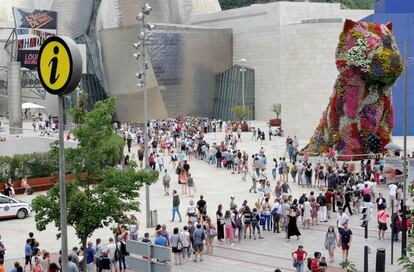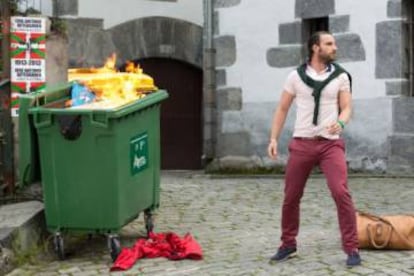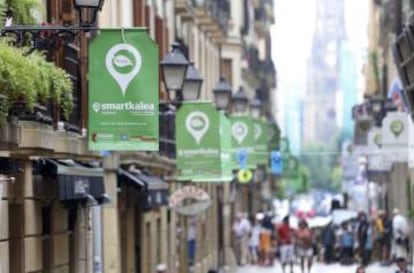Just who are the Basques anyway?
Five years of peace are blurring the lines that once separated people in this northern region


An event earlier this month in the Basque city of Bilbao organized by the Catalan pro-independence organization ANC and the similarly minded Basque group Gure Esku Dago, produced scenes that could have been taken from a Spanish television sitcom.
Since the Catalans did not understand Basque and the Basques did not speak Catalan, both groups ended up communicating in Spanish, even though separatists from both regions typically balk at using the language “of the Spanish State.”
There is no more permanent classification of people according to their routine actions
Screenwriter Borja Cobeaga
But perhaps the most comical moment came when Catalan speaker Hadar Auxandri expressed his envy of the Basque Country’s tax system, which gives the region greater powers of collection than other parts of Spain – and which Catalonia has long been demanding for itself – while saying it was bad for supporters of Basque independence.
His reasoning was that the quality of life enjoyed by many Basques is stifling the kind of public discontent that might trigger a strong pro-independence movement.
“I envy you, but only partly, because otherwise in Catalonia we wouldn’t have had that tipping point that set events in motion,” he told a crowd of around 50 people.
There was an uncomfortable silence, as though people felt they were being told to stop complaining. Or as though having a good standard of living might be a problem.

But five years on from the unilateral ceasefire declared by the armed group ETA, and an end to its terrorist activities, those old stereotypes that provided fodder for so much gallows humor are beginning to change.
“People are no longer classified according to how they live their lives,” explains Borja Cobeaga, 39, who co-wrote the blockbuster comedy Eight Basque Surnames. “It used to be insane: every single everyday decision was a political statement – participating in this or that sports race, the clothes that you wore, the newspaper that you bought...But when we realized that it was all nonsense, those habits began to let up.”
“Groups now mix with one another, whereas they used to be isolated worlds,” adds this native of San Sebastián. “Things have relaxed tremendously. Perhaps not so much at the institutional or political level, or within some families, but it’s very noticeable on the surface of society.”
The ideological barriers used to extend into the daily world. There were streets and bars where some Basques would never set foot, out of fear or personal beliefs. Now there are few such places left. The old quarter of San Sebastián used to be considered a stronghold of the leftist radicals known as the abertzale, and some establishments were off limits to locals who did not sympathize with ETA and its supporters.
A “caste” system
Óscar Terol, 47, is one of the creators of Vaya semanita, a popular television show that poked fun at the Basques and their foibles. This native of San Sebastián agrees with the view that Basque society used to be divided into distinct groups.
“The groups were like castes, self-excluding,” he says. “You couldn’t understand the others and there were pariahs, socially marginalized people. We had nothing in common. Ideology was hot-branded into us, it was powerful like a religion. We Basques are very religious, and we held on to ideology like it was a religion.”
Besides the end of collective fear that followed ETA’s decision to lay down its weapons, there was another big change, notes Terol. For the first time a radical party, EH Bildu – the successor to Batasuna, ETA’s political wing- had a stint in government in the province of Guipúzcoa, where its management attracted a lot of controversy, and this enlightened its followers to the fact that running a government is not as easy as it seems.
The people who used to cheer for ETA now have a interest in blending in with the crowd
Writer Juan Bas
But some things have yet to change. The way people dress is still a relatively fail-safe way to know which way they are going to vote, although this is increasingly less the case.
“The Batasuna crowd is still the same, dressing as though they’d just come down the hillside; they positively cultivate an ugly look, and favor tracksuits and brownish colors,” says writer Juan Bas, who is also head of the Bilbao humor festival Ja!.
“What has definitely changed is the bar scene: it used to be that you just didn’t walk into some bars because of disputes going all the way back to the [19th-century] Carlist Wars. Save for a few very specific exceptions, there are no more ghetto bars in the old part of Bilbao,” he adds.
Cobeaga believes that the borroka look, so named after the street vandalism once carried out by ETA sympathizers, “has become passé.”

In fact, Terol confesses that he has a soft spot for individuals who still cling to those old symbols.
“I’m talking about those people who still sport a rat's tail haircut and wear specific clothes and say: I come from this clan, I am the last of the Mohicans of my species...,” says Cobeaga. “It’s the culture of the caserío [Basque farmstead], where each caserío was a world unto itself and there were thousands of ways to interpret a single culture. It is a constant way of claiming nuance for yourself. We are still tribal people.”
Cobeaga brings up an old saying by Basque writer Bernardo Atxaga: “If we Basques ever shrugged off the weight we carry around, we would levitate two meters above ground.”
But Bas believes there is something else going on as well.
“The people who used to cheer on ETA now have an interest in blending in with the crowd, in throwing earth over the past and saying that now we’re all getting along and living in peace,” he notes.
“But there are people I used to keep away from and will continue to. That attitude was just too vile and despicable to simply forget.”
Bas says that each time he goes out in the street, he passes by a well-known representative of the Basque radical left, “and we do what we have to do: we each look the other way.”
English version by Susana Urra.
Tu suscripción se está usando en otro dispositivo
¿Quieres añadir otro usuario a tu suscripción?
Si continúas leyendo en este dispositivo, no se podrá leer en el otro.
FlechaTu suscripción se está usando en otro dispositivo y solo puedes acceder a EL PAÍS desde un dispositivo a la vez.
Si quieres compartir tu cuenta, cambia tu suscripción a la modalidad Premium, así podrás añadir otro usuario. Cada uno accederá con su propia cuenta de email, lo que os permitirá personalizar vuestra experiencia en EL PAÍS.
¿Tienes una suscripción de empresa? Accede aquí para contratar más cuentas.
En el caso de no saber quién está usando tu cuenta, te recomendamos cambiar tu contraseña aquí.
Si decides continuar compartiendo tu cuenta, este mensaje se mostrará en tu dispositivo y en el de la otra persona que está usando tu cuenta de forma indefinida, afectando a tu experiencia de lectura. Puedes consultar aquí los términos y condiciones de la suscripción digital.








































